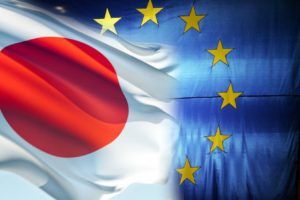1 February 2020 marks the first anniversary of the entry into force of the EU-Japan Economic Partnership Agreement (EPA). In the first ten months following the implementation of the agreement, EU exports to Japan went up by 6.6% compared to the same period the year before. This outperforms the growth in the past three years, which averaged 4.7% (Eurostat data). Japanese exports to Europe grew by 6.3% in the same period.
Certain sectors have seen even stronger export growth over the same period:
- Meat exports increased by 12%, with a 12.6% increase for pork exports, and frozen beef exports have more than tripled.
- Dairy exports were up by 10.4% (including a 47% increase in butter exports).
- Beverages exports went up by 20%, with 17.3% growth in wine exports.
- Leather articles exports and apparel have seen an increase of 14% and 9.5%, respectively.
- Electrical machinery exports, such as telecommunications equipment, storage devices and electronic circuits went up by 16.4%.
The EU-Japan EPA offers new opportunities for EU businesses of all sizes to export to Japan. It removes the vast majority of the €1 billion in duties that were charged annually on EU exports to Japan. Once the agreement is fully implemented, Japan will have scrapped customs duties on 97% of goods imported from the EU and annual trade between the EU and Japan could increase by nearly €36 billion.
Sectors that stand to benefit from the EU-Japan EPA include for example:
- Spanish leather goods: Spanish shoe company Masaltos gets nearly two-thirds of its revenue from overseas sales, with Japan accounting for 4%. It has become more competitive on the Japanese market, as the EPA has helped reduce costs for exporters of luxury products.
- French seeds: France’s HEMP-it is a farmers’ cooperative specialising in producing and certifying seeds. They have been working with the Hokkaido Hemp Association for the past four years, trying to restart the traditional hemp crop in Japan. The EU’s trade agreement with Japan could help develop the business between HEMP-it and Japanese farmers by developing plant varieties without any THC.
- Irish beef: Bord Bia, the Irish Food Board, has been promoting EU beef in a project co-financed by the EU. The campaign seeks to highlight Europe’s high standards of food safety, quality and sustainability in Japan. Thanks to the EU-Japan EPA, tariffs on beef will gradually fall to 9% over the period of the agreement. This means Irish beef products can be sold at competitive prices.
Background
The EPA creates new opportunities for European farmers and food producers, while fully protecting the EU’s interests. Thanks to the agreement, 211 high-quality food and drink products from the EU (so-called “geographical indications”) can now be sold under their own name in Japan and are protected from imitation.
In addition, the EU has gained better access to public contracts in Japan, one of the largest public procurement markets in the world. The agreement also offers better conditions for services suppliers, greater mobility for company employees, and a framework to enable the mutual recognition of professional qualifications.
The EU and Japan have also agreed to set ambitious standards on sustainable development, including for the first time a specific commitment to the Paris Climate Agreement.
More Information
EU-Japan trade agreement enters into force







Leave a Reply